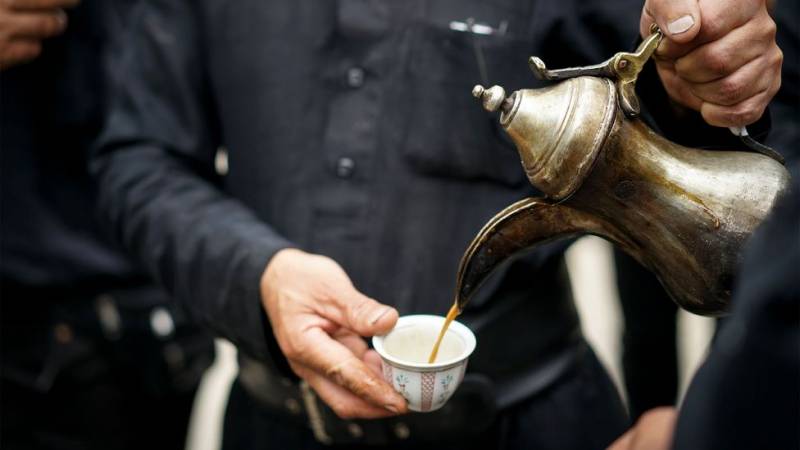Coffee isn't just a drink in Saudi Arabia, it's an ancient tradition of hospitality – and as the country opens to tourism, it's also one of its most interesting draws.
Jabar Al-Maliki stepped onto a stone perch and looked out over the boundless landscape. High up in the clouds at 1,600m, he peered over the craggy mountain tops cascading into terraced farms lined with coffee trees, banana plants and corn crops. Colourful houses and stone fortresses speckled the steep slopes of the Sarawat Mountains, which extend from Saudi Arabia's Jazan region over the border into Yemen just a few kilometres away. He whistled at a scurrying hyrax, the high-pitched echo ringing across the otherwise silent valley below. Then, with a twinkle in his eyes, he said, "It's time for qahwa [coffee]."
It is widely believed coffee beans were first roasted and consumed as the beverage we know today in the Sarawat Mountains in the 15th Century. Historically, the area was all part of greater Yemen, when borders were far less important than tribal and familial relationships. During that period, Arab historian Abd Al Ghaffar first documented an infusion made from roasted, ground coffee beans used by Sufis (Islamic mystics) to help them stay awake during religious recitations. Over time, it became an essential aspect of Arabian culture, with public cafés called maqha sprouting up across the region, where men would sit and drink coffee and share ideas.
But despite being an essential aspect of local Arabian culture for hundreds of years, Saudi Arabia's coffee has only recently been celebrated as a critical part of the country's cultural and historical heritage, a distinction further commemorated by the government's declaration of 2022 as the Year of Saudi Coffee.
"Coffee is part of my heritage and lineage," said Al-Maliki, whose farm dates back more than 130 years. "My grandfather, father and I climbed up and down these 2,000-year-old terrace rock steps under the sun's heat, carrying coffee cherries over our shoulders with just a sling cloth." Now, he shares his practices with his sons.
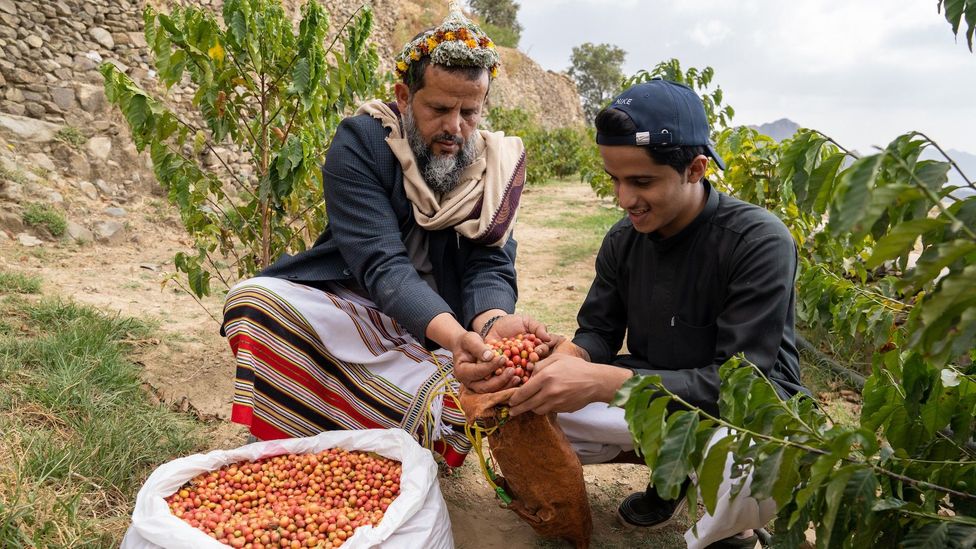
"Coffee is part of my heritage and lineage," said Al-Maliki, whose farm dates back more than 130 years (Credit: Matt Reichel)
We'd been road-tripping through Saudi Arabia for a month, and the journey to Al-Maliki's farmhouse had been particularly nerve-wracking: a slow, winding drive up and down steep mountain roads with continuous hairpins and groups of hamadryas baboons settled along the roadside. But it was a daring adventure that rewarded us with staggering views and an opportunity to explore Saudi Arabia's largest coffee-growing region.
As we watched, Al-Maliki's sons roasted coffee beans harvested from their fields in a cast-iron pan over an open fire, gently stirring them with a long metal stick flattened on one end. Typically, the beans are lightly roasted, ground and added to boiling water. Sometimes the brew is infused with spices like cardamom, ginger and cloves. We tried a lightly roasted version and a bitter, robust dark roast without spices. Both had a subtle flavour, more reminiscent of a cup of tea than a strongly brewed coffee.
The Jazan region is known across Saudi Arabia for its prized Khawlani coffee, named after the ancient tribes of Khawlan who lived between today's Saudi Arabia and Yemen. Cultivated at more than 800m above sea level, Khawlaniis defined by its high-altitude, fertile growing conditions, along with the grade of beans and the degree of roasting. No matter how it's prepared though, the coffee forms the cultural identity of the farmers here. They think of its cultivation as a 300-year-old art passed down through generations, and they consider the hospitality around it as a time-honoured tradition that strengthens social bonds across the remote valleys. Small cups of piping hot coffee require constant attention and refilling, allowing hosts to show respect and care for their guests.
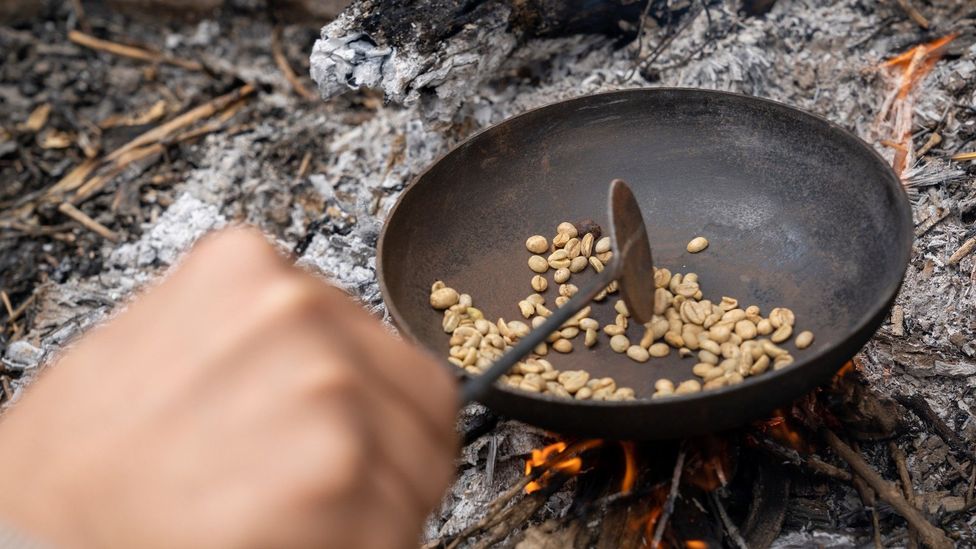
As we watched, Al-Maliki's sons roasted coffee beans harvested from their fields in a cast-iron pan over an open fire (Credit: Matt Reichel)
"We love all kinds of coffee. It's part of our everyday lifestyle, but many people don't even know that coffee is grown right here in Saudi Arabia," said Sara Alali, an internationally licensed coffee grader and café owner from the capital city, Riyadh. "Khawlani beans are considered special because of their origin in the southern part of the Arabian Peninsula."
Extending knowledge of Khawlani locally and internationally – and highlighting the coffee rituals specific to Saudi Arabia – are the goals of the Year of Saudi Coffee. The countrywide campaign includes competitions, festivals and workshops; and restaurants and cafes have even been instructed to refer to coffee as "Saudi coffee" instead of "Arabic coffee", as it is sometimes called.
To promote their farms, some local coffee growers have begun to post photos on social media, list their farms on Google and work with tourist guides. And while tourism in this remote corner of the country is still in its infancy (Saudi Arabia only started issuing tourist visas in September 2019), family coffee farms such as Al-Maliki's sit at the forefront of a societal shift within the Kingdom, one that encourages families to open up their lives and traditions to outsiders in an effort to establish community-based tourism initiatives.
Jazan is home to the largest concentration of coffee growers in the Kingdom. There are 724 coffee farmers, according to 2017 data from the Ministry of the Interior, with around 152,000 trees and an average production of 450,000 kg of coffee. For now, Khawlani coffee is primarily sold domestically, and high-grade beans can fetch prices as high as 100 rials (£21) per kilo, according to Al-Maliki, because they are positioned as a luxury, hand-picked, labour-intensive product.
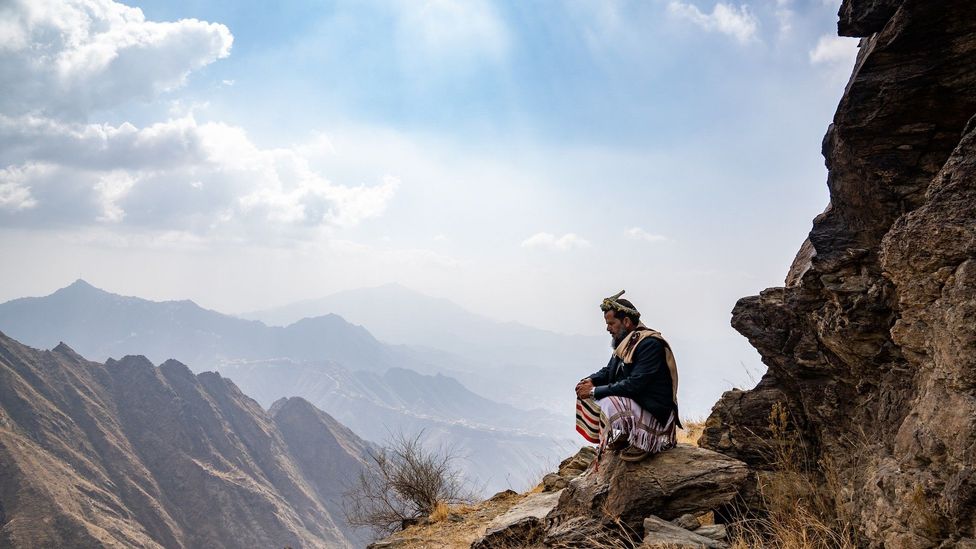
The Jazan region is known across Saudi Arabia for its prized Khawlani coffee (Credit: Matt Reichel)
The hope is that Khawlani coffee's rich heritage and flavour will come to be recognised beyond Saudi's borders, too. "The government is promoting coffee plantations as a great destination," said Alali. Before this year, Al-Maliki rarely saw foreign visitors, except as part of agricultural research projects. Since October 2021, though, he's received a trickle of guests from Latin America and Asia.
A few other farms have also opened their doors to visitors. After a two-hour drive down near-vertical switchbacks from Al-Maliki's farm, we arrived at the Wadi Al Ain coffee estate, located in the village of Al-Aeen. We walked over a hanging bridge to a modern, Bedouin-style sitting area overlooking expansive coffee plantations with workers moving busily around the trees. Against the backdrop of the mountains and a glowing, orange sunset, owner Salem Al-Nakhaifi and his family treated us to a multi-grade coffee tasting: light, medium light and dark-roast. With each tasting, they encouraged us to move from one sitting area to the next so we could experience every part of the property – a 500-year-old farm that had been converted into an estate with a restaurant and a guesthouse so visitors can stay overnight.
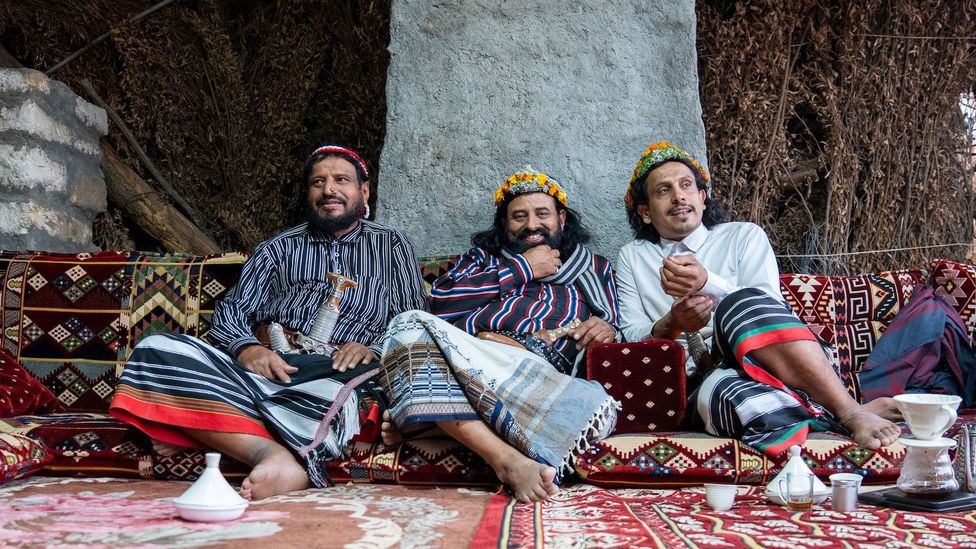
Social media sensation Al-Raithi (right) gave us a joyous greeting and immediately prepared coffee in small cups, served out of a long, ornate silver pot (Credit: Matt Reichel)
Three hours north-west from there, near the spectacular Wadi Lajab canyon, we met another local farmer, social media sensation Faisal Al-Raithi. His nephew escorted us to their hosting area in a 1970s Land Cruiser, and when we arrived, Al-Raithi was seated in a large Bedouin tent with other tribesmen, all wearing elaborate, colourful floral headpieces. He gave us a joyous greeting and immediately prepared coffee in small bronze cups, served out of a long, ornate silver pot called a dallah.
Throughout the day, the hospitality did not stop. Al-Raithi served us a traditional meal of herb-roasted goat with rice and homemade bread prepared over hot coals. We took an hour-long hike overlooking the Wadi Lajab valley and returned to see his camels munching on tamarinds off the trees. Just before sunset, the men sang local songs over cups of tea and dried dates. We didn't stay overnight, but Al-Raithi said visitors are welcome to sleep in their hosting area. Eventually, he wants to set up individual bedouin-style canvas tents overlooking the canyon.
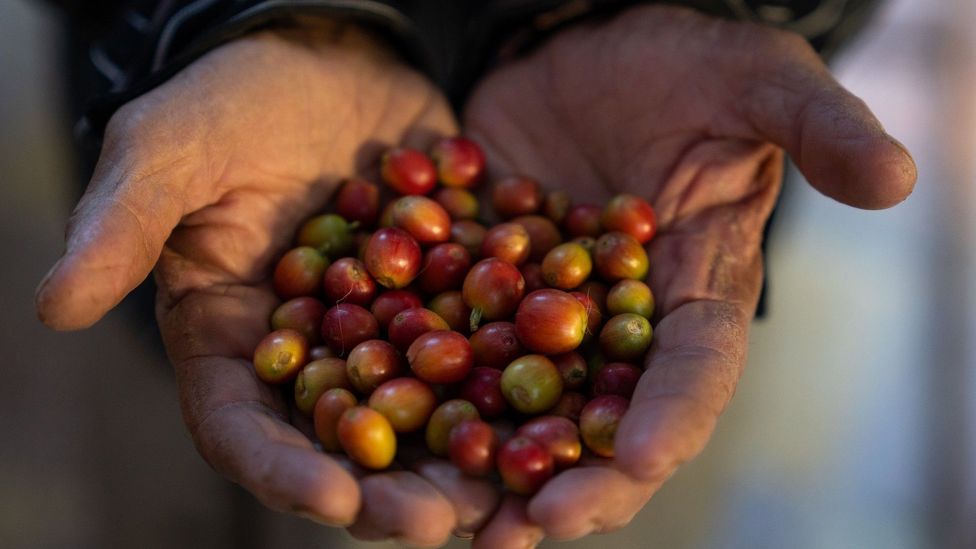
The goals of the Year of Saudi Coffee are to extend knowledge of Khawlani internationally and highlight the coffee rituals specific to Saudi Arabia (Credit: Matt Reichel)
The most memorable part of the experience was the farmer himself. Al-Raithi was a vibrant, compelling character who loved to talk, especially about anything related to coffee. "We treat the coffee trees like humans," he said, describing the care his community has been lavishing on the crop for more than 300 years. All parts of the coffee cherry are used, and nothing is thrown away. Beans are carefully harvested and then dried for 21 days. Peels are soaked in water for daily drinking and are considered a pain remedy.
This type of tourism is still niche and developing. Farmers like Al-Raithi, Al-Maliki and Al-Nakhaifi are just starting to create a footprint online and determining how to open their doors more publicly for coffee tastings and small tours. Many of these farms are not open to walk-ins; however, owners are happy to arrange a visit if contacted in advance. For now, they are just a tiny fraction of more than 700 farmers considering community-based tourism under the countrywide campaign.
As Alali explained: "For Arabs and Saudis, coffee is an integrated part of our culture and identity. It's how we show generosity and hospitality." The opportunities are endless.
